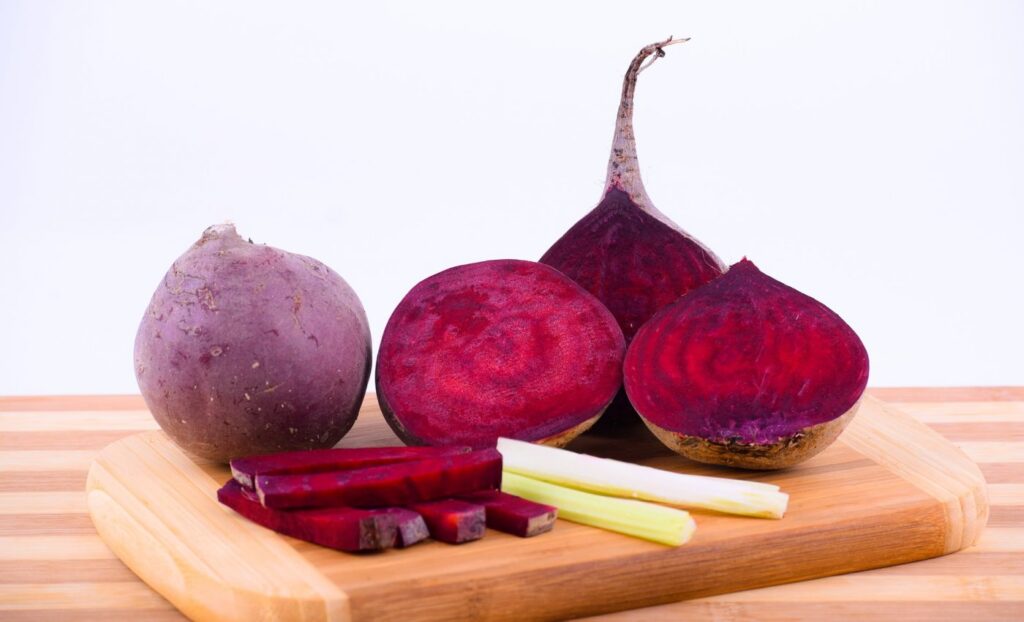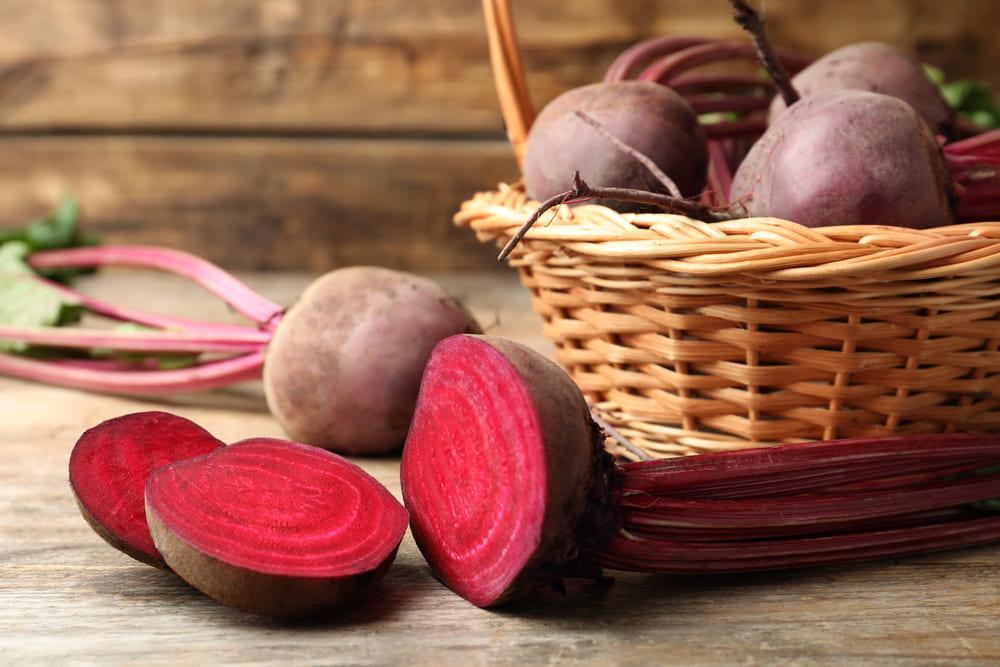Beetroot, with its deep red hue and earthy flavor, is more than just a colorful addition to your plate. This humble root vegetable is a nutritional powerhouse, packed with vitamins, minerals, and antioxidants that offer a wide range of health benefits. From boosting athletic performance to supporting heart health, beetroot is a versatile and delicious superfood that deserves a regular spot in your diet.
In this blog post, we’ll explore the benefits, properties, and potential contraindications of beetroot.
What Makes Beetroot So Special?
Beetroot is rich in essential nutrients and bioactive compounds that contribute to its health-promoting properties. Here’s a breakdown of its impressive nutritional profile:
- Nitrates: Beetroot is one of the best dietary sources of nitrates, which help improve blood flow and lower blood pressure.
- Antioxidants: It contains betalains, which give beetroot its vibrant color and have potent anti-inflammatory and detoxifying effects.
- Fiber: Beetroot is high in dietary fiber, which supports digestion and gut health.
- Vitamins and Minerals: It is a good source of folate, vitamin C, potassium, iron, and manganese, which are essential for overall health.
- Low in Calories: Beetroot is low in calories but high in nutrients, making it a great addition to a balanced diet.
Health Benefits of Beetroot
Beetroot offers a wide range of health benefits, thanks to its unique combination of nutrients and bioactive compounds. Here are some of the top reasons to include beetroot in your diet:
1. Improves Heart Health
The nitrates in beetroot are converted into nitric oxide in the body, which helps relax and dilate blood vessels, improving blood flow and lowering blood pressure. This reduces the risk of heart disease and stroke.
2. Boosts Athletic Performance
Beetroot juice is a popular supplement among athletes because of its ability to enhance endurance and performance. The nitrates in beetroot improve oxygen delivery to muscles, reducing fatigue and increasing stamina.
3. Supports Brain Health
The nitrates in beetroot also improve blood flow to the brain, enhancing cognitive function and reducing the risk of age-related cognitive decline. Beetroot’s antioxidants further protect brain cells from oxidative stress.
4. Aids Digestion
The high fiber content in beetroot promotes healthy digestion and prevents constipation. It also supports the growth of beneficial gut bacteria, contributing to a healthy gut microbiome.
5. Detoxifies the Body
Beetroot contains betalains, which support liver function and help detoxify the body by neutralizing toxins and promoting their elimination.
6. Fights Inflammation
The antioxidants in beetroot, particularly betalains, have strong anti-inflammatory properties, which can help reduce inflammation and alleviate conditions like arthritis.
7. Supports Weight Loss
Beetroot is low in calories and high in fiber, making it a great addition to a weight-loss diet. Its natural sweetness can also satisfy sugar cravings without the added calories.
8. Improves Skin Health
The antioxidants and vitamin C in beetroot promote collagen production and protect the skin from damage caused by free radicals. This helps reduce signs of aging and keeps the skin looking youthful and radiant.
Creative Ways to Consume Beetroot
Beetroot is incredibly versatile and can be enjoyed in a variety of ways. Here are some ideas to incorporate beetroot into your diet:
1. Raw
Grate or slice raw beetroot and add it to salads for a crunchy and colorful addition. Pair it with goat cheese, walnuts, and arugula for a delicious and nutritious salad.
2. Roasted
Roasting beetroot brings out its natural sweetness and enhances its flavor. Toss beetroot cubes with olive oil, salt, and pepper, and roast them in the oven until tender.
3. Juiced
Beetroot juice is a popular way to enjoy its health benefits. Combine beetroot with other fruits and vegetables like apples, carrots, and ginger for a refreshing and nutrient-packed drink.
4. Soups
Beetroot soup, also known as borscht, is a traditional dish in Eastern Europe. It’s a hearty and nutritious meal that can be enjoyed hot or cold.
5. Smoothies
Add cooked or raw beetroot to your smoothies for a boost of nutrients and a vibrant color. Pair it with berries, bananas, and yogurt for a delicious and healthy smoothie.
6. Pickled
Pickled beetroot is a tangy and flavorful condiment that can be added to sandwiches, salads, or enjoyed on its own.
7. Baked Goods
Beetroot can be used in baking to add moisture and natural sweetness to cakes, muffins, and brownies. Try adding grated beetroot to your favorite recipes for a healthy twist.
Potential Contraindications of Beetroot
While beetroot is generally safe and beneficial for most people, there are a few considerations to keep in mind:
- Kidney Stones: Beetroot is high in oxalates, which can contribute to the formation of kidney stones in susceptible individuals. If you have a history of kidney stones, consult your doctor before consuming large amounts of beetroot.
- Low Blood Pressure: The nitrates in beetroot can lower blood pressure, which may be problematic for individuals with already low blood pressure. Monitor your blood pressure if you consume beetroot regularly.
- Beeturia: Some people may experience a harmless condition called beeturia, where their urine or stool turns pink or red after consuming beetroot. This is not a cause for concern but can be surprising.

Beetroot is a vibrant and nutrient-dense superfood that offers a wide range of health benefits. From improving heart health and boosting athletic performance to supporting brain health and detoxifying the body, beetroot is a versatile and delicious addition to any diet. Whether you enjoy it raw, roasted, juiced, or blended into smoothies, there are countless ways to incorporate this powerhouse vegetable into your meals.
Have you tried beetroot before? What’s your favorite way to enjoy it? Share your thoughts and recipes in the comments below!
Disclaimer: This blog post is for informational purposes only and should not replace professional medical advice. If you have specific health concerns, consult a healthcare provider before making significant changes to your diet.

